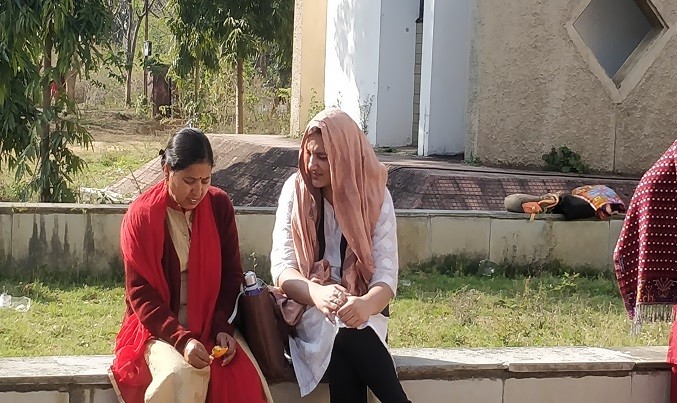16-year old Nirmala weighed 43 kgs and had a haemoglobin level of 5.8 when she was eight months pregnant. She was a “high-risk pregnancy”, and after much coaxing over multiple visits by the on-ground health worker she agreed to travel 4 kilometres (2.5 miles) on foot and 11 kilometres (6.8 miles) in a bullock-cart to the nearest hospital for her delivery. She is now the mother of a healthy six-month old boy.
She was lucky; more than half of the maternal deaths in India are among the 8.6% tribal population. Less than 15% of tribal women meet the recommended protocol of ante-natal care. Across the continuum of care, tribal women have poorer access to adequate maternal and child health services than their counterparts elsewhere in India.
By increasing access to quality maternal health services and emphasising on two important social determinants of maternal health – literacy and age of marriage – India has succeeded reducing maternal mortality by 77% in the last 19 years.
However, the last leg is the toughest. How do we reach the most marginalised women in remote villages to ensure safe deliveries for them?
There is no data on health, health-care and finances specific to the 104 million-strong tribal population in India, and the budgetary plans and allocations for the tribal population remain buried under “rural healthcare”. Alarmingly, there are no existing institutional mechanisms to even gather or generate such data!
The challenges and needs of the tribal population are unique and need to be addressed differently. Tribal populations suffer from the “triple disease burden”: infections and communicable diseases, non-communicable diseases such as cancer and diabetes, and mental illnesses4. The nutritional parameters are poorer: anaemia among tribal women is 38% higher than it is in the non-SC-ST population in India and the Infant Mortality Rate (IMR) among tribal children is 20% higher than the national average.
Continued disproportionate health outcomes indicate the need for a different approach to address the maternal health challenges in these communities. To paraphrase American writer and activist Audre Lorde, it is not our differences that separate us, but our inability to accept and acknowledge them.
Maternal health services for tribal women need to be tailored to their needs, instead of being replicated naively from modern health practices or relying on monetary incentives to motivate health-seeking behaviour. To improve maternal health outcomes, we need to adopt a three-pronged strategy: provide last-mile access to care, leverage technology to provide better quality care, and increase utilisation of services provided by being more culturally sensitive and building trust in the community.
Solutions to combat poor maternal healthcare
Last mile access can be improved through effective community-based care, adequate ante-natal counselling, and provision of emergency transportation services. The Government of Madhya Pradesh, along with UNICEF, piloted a 24x7 Free Referral Transport system for pregnant women (home to facility, inter-facility and drop back) which contributed to the increase in institutional delivery from 47% to 83% in Madhya Pradesh over a five-year period.
We also need to preserve and build beneficial traditional practices by integrating last-mile health workers into the system and focus on safer deliveries – at home or in a health centre.
There is tremendous scope to leverage technology to improve health outcomes. Mobile applications can help identify and track high-risk pregnancies, increase on-ground reach by incentivising field workers, and strengthen the referral chain to make patient data accessible. Tech solutions can conduct point-of-care diagnostic tests, improve the performance of field workers by providing training support and work as job-aids to guide them through complex tasks. Telemedicine centres and electronic medical records also hold great promise.
Through our research, we learnt that tribal communities view pregnancy and childbirth as a natural phenomenon that does not warrant external interventions. Doctors in white coats and sterile, white-washed, multi-storied hospital buildings are viewed as intimidating. Respecting tribal culture and community beliefs, the Society for Education, Action and Research in Community Health (SEARCH) has built a tribal-friendly hospital in Gadchiroli. The clinics are modelled on a typical tribal home with mud flooring and thatched roofs. Outpatient departments feature large, tree-lined open spaces for patients to wait and mingle. To overcome access barriers, the state of Jharkhand established Sahiyya Help Desks in District Hospitals and Community Health Centres to help patients navigate complex, often culturally alien and unfriendly health facilities. Anecdotal evidence suggests that these desks significantly reduce the fear of being misunderstood on account of language and socio-cultural differences and improve awareness of entitlements and services, grievance redressal, and feedback regarding services.
To drive community behaviour change, we need to go beyond acknowledging the distinctiveness of the tribal population and learn to understand their culture and beliefs. We must eschew the cookie-cutter approach that seems to characterize many proposed solutions to this challenge.
Tailoring interventions to the needs of tribal people will promote health-seeking attitudes, improve the overall nutritional status and enable better integration. This will facilitate better outcomes for mothers and children.
Shaivi Chandavarkar is a senior consultant in the CSR Advisory team at Sattva. A physical therapist by training, Shaivi has experience in strategy consulting, project management, business development, and marketing communications in healthcare projects. At Sattva, she works on healthcare social impact projects, with a focus on maternal health.









